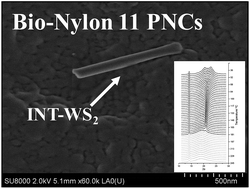Bio-based polymer nanocomposites based on nylon 11 and WS2 inorganic nanotubes
Abstract
Tungsten disulphide nanotubes (INT-WS2) have been successfully dispersed in a bio-based polyamide matrix (nylon 11) by conventional melt processing. The effect of INT-WS2 content on the morphology, thermal stability, crystallization behaviour and dynamic mechanical properties is investigated. The results indicate that these inorganic nanotubes can be efficiently incorporated into the bio-based polymer matrix without the need for modifiers or surfactants. Additionally, it is found that the non-isothermal crystallization behaviour of nylon 11/INT-WS2 depends on both the cooling rate and INT-WS2 concentration. In particular, crystallization kinetics results demonstrate that the nucleating activity of INTs plays a dominant role in accelerating the crystallization of nylon 11. This fact leads to the appearance of the more-disordered phase at higher temperature. More significantly, it was shown that these INT-WS2 nanocomposites can facilitate a good processability and cost efficiency, and will be of interest for many eco-friendly and medical applications.


 Please wait while we load your content...
Please wait while we load your content...